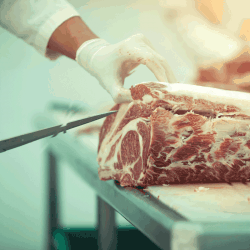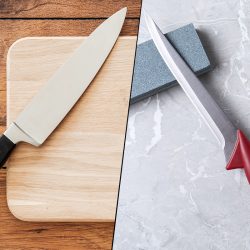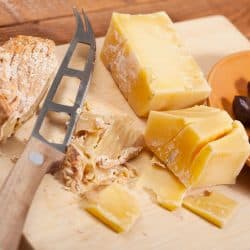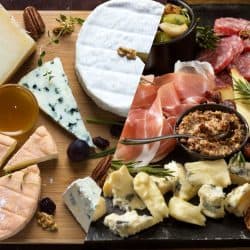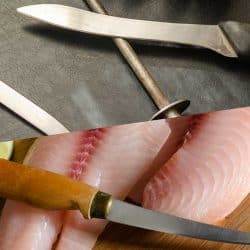Cheeseboards are the bomb, but can the cutting of fancy cheese dull your knives? Some cheeses are super soft, like brie and other double creme cheeses, some are quite hard. We've researched to find out if using knives on cheese can affect a knife's sharpness.
Any knife, when used regularly, is going to get dull. Though cheese itself isn't that hard, the torque of cutting can affect the strength of the knife. Soft cheeses shouldn't affect your knives at all, but if you're cutting into big blocks of hard cheese, you may want a specialized double-handled knife. Softening your cheese before cutting will help.
Let's look more closely at this question. We'll also explore the best knives for cutting cheese, if and how you should sharpen them, why cheese knives are curved, why they have holes in them if you can use cheese knives for other things, and if you really need a cheese knife at all. So please keep reading to find all of these topics and answers.
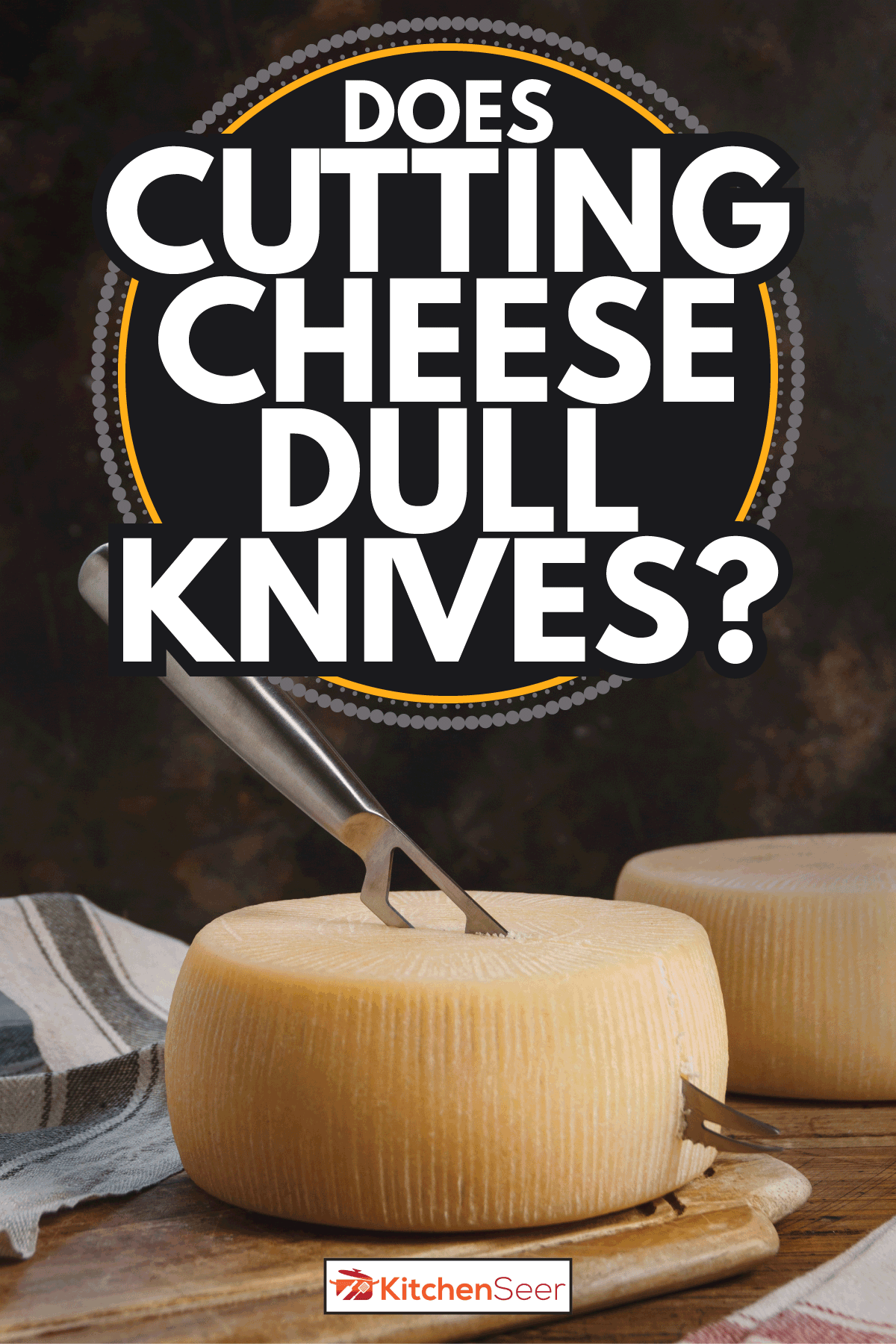
Does Cutting Cheese Dull Knives?
There are many reasons why you need to cut cheese. Perhaps you work in a restaurant, or maybe you're in charge of the cheeseboards for a large gathering. Cheese, like other foods, is varied. But some are quite hard and will come in large rounds or chunks that aren't so easily handled. Which means you'll need to cut them into smaller pieces.
Some hard cheeses, like Parmesan and Romano, are traditionally broken into chunks by hand. This is a perfectly acceptable presentation, but maybe you want it to look neater. Because these cheeses come in large rounds, cutting them can be hard on your knives. Though it won't necessarily dull the blades, it can cause torque and friction, which might cause your blades to warp. This warping effect will make it difficult to cut the large rounds.
What Knife Is Best For Cutting Cheese?
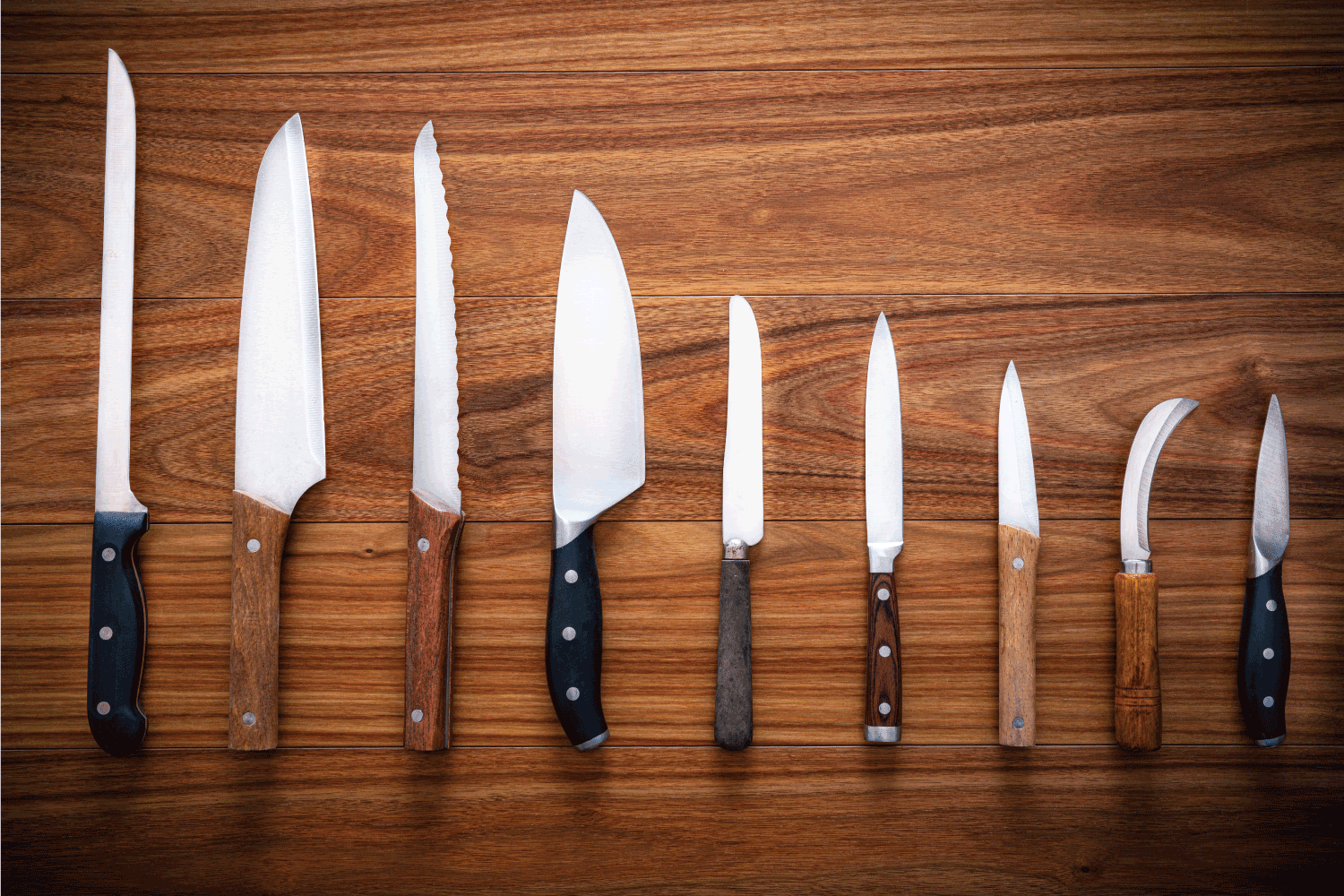
If you're cutting large blocks or chunks of hard cheese, you might consider getting a double-handled cheese knife. These knives give you the leverage of really putting your weight behind them without worrying about torque or twisting. These knives can be under twenty dollars or hundreds of dollars, depending upon the type of steel and level of professional use you need.
We like this lower to mid-ranged knife for a starting point.
Click here for this on Amazon.
Some chefs really like to use boning knives for their cheese. Boning knives have a thin blade and are exceedingly sharp. This type of knife would be better suited to soft cheeses as the torque of hard cheese might damage the blade.
This high-quality boning knife from Wusthof can be found here on Amazon.
Some chefs even forego a knife altogether and suggest using a cheese wire. A cheese wire gives you a smooth cut and a neat edge. It's great for slicing off individual slices of cheese or smaller servings. It's a great thing to have in a home kitchen to put out with a cheese tray as it's also safer than a knife if it falls off of a table or tray.
This great value cheese slicer may be found here on Amazon.
Should You Sharpen Cheese Knives?
With any knife, even cheese knives, it's a great idea to keep them honed when they start to lose their zing. This can be done at home or by a professional. But if you can commit to taking care of your knives, you will have them for a very long time. And you'll be more pleased with how they cut smoothly.
Here's a fun video of a professional knife repair person working on fixing up a large two-handled cheese knife!
If you don't have this level of equipment, it's possible to do it at home with a few simple honing tools. This set comes with instructions on the right angle to run your blade along the honing rod.
Click here for this on Amazon.
Why Is A Cheese Knife Curved?
The cheese knives used for serving cheese at the table are often smaller and duller than those used to cut cheese for commercial and restaurant purposes. These little knives often have decorative handles and a slightly curved shape with a broader surface.
The purpose behind this shape is to allow the knife to both cut through the cheese pieces and easily spread softer cheeses onto crackers and bread. It's a bit of a blend between function and form. Also, they are often called cheese spreaders.
Click here for these on Amazon.
Why Does A Cheese Knife Have Holes In It?
Another common type of cheese knife made for the residential cheese tray is one that has holes in it. Why in the world would a knife have holes in it? These knives are also known as hollow knives, and the theory is that by having the airflow, the cut of the knife won't change the shape of the cheese left behind.
The forked end also helps pick up the sliced piece or move it around on the cutting board. We think these knives look a bit like swiss cheese!
This Boska Holland cheese knife set is specifically for charcuterie and cheese trays. Click here for this on Amazon.
Can You Use Cheese Knives For Other Things?
There's no reason why you can't use your cheese knives for other things. Use the curved spreaders for other condiments or spreads. If you use a boning knife, use it for its original purpose - cutting meat. Use the charcuterie knives for cutting sliced meats or olives. The large two-handled cheese knife could be used for slicing other things of similar consistency.
Do You Really Need Cheese Knives?
This may be part of that age-old question of need versus want. It's true; you can probably get away with cutting your cheese with a regular old knife from your flatware collection. You could probably cut a block of cheese with one of your larger knives.
But with charcuterie boards all the rage these days, for under fifty dollars, you can have a really nice set of lovely cheese knives to complete the look. Do you need them? Probably not, but if you want them, then why not?
And if you're looking to impress someone you know who entertains with a gift they're not likely to get for themselves, why not give them a gorgeous set of Wusthof cheese knives? These are top-quality knives that look beautiful on any cheeseboard.
Click here for this on Amazon.
And That's Our Final Word On Cutting The Cheese
Though cheese knives won't significantly dull your blades, be sure you're using a knife strong enough to withstand any twist. Also, if the blades do begin to dull, remember to sharpen them to keep them in tiptop shape.
We have some other great posts here at KitchenSeer.com that may be of interest to you.
Cheese Board Vs. Charcuterie Board – What Are The Differences?
What Kind of Wood is Used for Cheese and Charcuterie Board?


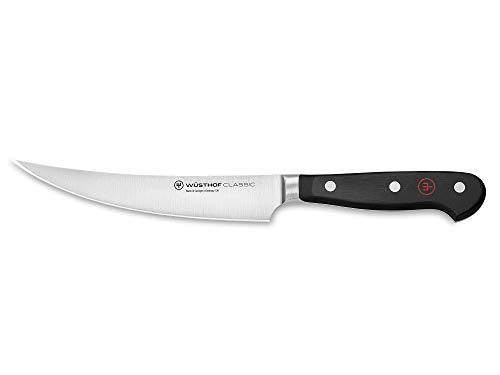





![set of cheese knives on a round wooden board. 14 Types Of Cheese Knives [Inc. What Cheese They're Good For And Why]](https://kitchenseer.com/wp-content/uploads/2021/07/set-of-cheese-knives-on-a-round-wooden-board.-14-Types-Of-Cheese-Knives-Inc.-What-Cheese-Theyre-Good-For-And-Why-250x250.png)
